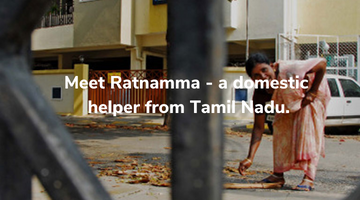Meet Ratnamma - a domestic helper from Tamil Nadu.
- Home
- Meet Ratnamma - a domestic helper from Tamil Nadu.

Meet Ratnamma. Born in Tamil Nadu, she moved to Bangalore 4 years ago, and has worked at our house for more than a year now. In my 22 years, she is the most dynamic domestic help we’ve had; almost always cackling away at me, or my brother, or herself, or the jokes that we make about her.Along with the cackling, she makes well-observed sarcastic remarks about the inhabitants of the house- ranging from our dog to my 4-month old niece, to my nearly 80-year old grandmother, to any other welcome (or otherwise) guest at our house- mostly in good humour!
She is also the only one at home who demands that I put away laundered clothes, oil-comb-and-plait my hair, and wear clothes that are ‘well-fitted’. She considers her fashion sense to be ‘tip-top’.
A mother of three children- two daughters and a son, she got married at the age of fifteen. I ask her if it was a love marriage and she blushes, chuckles a little and says ‘no’, but that a lot of boys used to pursue her. She adds that she was beautiful even though she is dark, and I tell her that it’s fashionable to be dark in today’s world. She looks my way with a mixture of disbelief and indifference, somewhat convinced about what I’m saying, but also still firmly hanging on to her own notions.
“It might have turned out better for me if I had married one of those boys,” she says. Her husband died a few years ago. They had taken him to NIMHANS for a wound his brother had caused due to a fight, stemming from property dispute. He went into the operation room at 8:30 in the morning with a deep gash on his shoulder, but came out without a kidney at 11 in the night. He stayed at home for the following two years, but eventually had to go back to work. Unfortunately, his body was unable to deal with the demands of manual labour: not only did he begin to bleed out, he also could not eat. This time they did not seek medical help. He told her that he would only be consuming resources, unable to contribute in any way to the family’s earnings, his existence would be adding to their heavy list of financial debt. His life was seen more as a means to livelihood, rather than an end in itself.
She asks aggressively what the connection between a wound on the shoulder and the kidney is, trying to find the answer that was never given to her, but there is a hint of defeat in her voice; maybe it comes from the finality of death.
She hopes to give her children better lives than the one she has gotten. Most of her earning is spent on educating her two younger children: her son studies to be an engineer, her daughter is in the IInd PUC. Her eldest daughter is married now, with children. She emphasizes that she got her daughter married by selling land and points to my notes, telling me to write down this specific fact that she feels proud about.
Ask her about her dreams for herself, and she says, without batting an eyelid, that first she wants her children to be successful. Secondary to this is the hope of having a good home to work at, good people to work with.
Then, chewing her post-lunch tobacco-filled paan, she recites a list of all the work that is yet to be done, hinting that she doesn’t have time to banter about her life’s happenings.
Here I want to profile less privileged women like Ratnamma who play essential roles in our everyday lives, but inhabit a world far removed from ours. In my brief yet vivid interactions with these women, I hope to get a glimpse of their lives, stories and dreams.